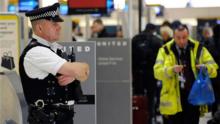
Security at London’s Heathrow Airport. (AP Photo, File)
(CNSNews.com) – As the Department of Homeland Security signals enhanced security at foreign airports for U.S.-bound flights, some Mideast experts view the biggest potential threat right now coming not from the burgeoning Islamic State of Iraq and the Levant (ISIS) but from al-Qaeda as it seeks to reassert its claim to lead the global jihad.
The rise of ISIS and its territorial gains in Iraq last month set off alarm bells about the threat it poses to the West, prompted in part by its leader’s own words and by fears that Westerners fighting with ISIS could carry out attacks on returning to their home countries.
But ISIS’s declaration this week of a “caliphate” in areas it claims to control and its demand that Muslims everywhere pledge allegiance to its leader Abu Bakr al-Baghdadi, amounted to a direct challenge to al-Qaeda, which sees itself as leading the jihad but has had few successes to boast of in recent years.
Al-Qaeda’s most likely response, some specialists believe, would be to attempt a significant terror attack in the West – possibly by its most effective affiliate, the Yemen-based al-Qaeda in the Arabian Peninsula (AQAP), or returning fighters from its Syrian branch, the Al-Nusra Front.
DHS Secretary Jeh Johnson in a statement Tuesday announced new security measures at certain, unidentified foreign airports offering direct flights to the U.S., a step arising from the department’s continuous assessment of “the global threat environment.”
“We will work to ensure these necessary steps pose as few disruptions to travelers as possible,” he said. “We are sharing recent and relevant information with our foreign allies and are consulting the aviation industry.”
Asked about the new measures, State Department spokeswoman Jen Psaki linked them broadly to concerns about Westerners returning from having fought with jihadist groups in Syria and surrounding areas.
“The threat of foreign fighters is a concern that we share with many counterparts in the world, whether that’s Europeans or others in the Western world, where we’ve seen an increase in foreign fighters who have traveled to Syria and other countries in the region and returning,” she said.
Jonathan Russell, political liaison officer for the Quilliam Foundation – a British think tank set up in 2008 to counter extreme Islamist ideology – wrote in an op-ed that the ISIS caliphate declaration would change the dynamic of the ISIS-al-Qaeda relationship.
“Al-Qaeda will now want to challenge ISIS’s appropriation of its key objectives and tactics,” he said. “The only way for al-Qaeda to stay relevant now is through a violent and spectacular attack.”
In a new policy paper on the al-Qaeda-ISIS rivalry Aaron Y. Zelin, a specialist on Salafi groups at the Washington Institute for Near East Policy, said that while it was too early to know for certain, “if current trends hold, ISIS has opened up a lead on al-Qaeda, which has a steep hill to climb just to stave off its own relative decline.”
“If al-Qaeda wants to reclaim some semblance of legitimacy, it will desperately pursue a major strike along the lines of the Madrid train bombings [in 2004, which killed 191 people], the July 7, 2005, London attacks [which killed 52 people and four bombers], or actualizing the failed AQAP plots in 2009 and 2010,” he said.
“At this point, though, momentum toward ISIS may be too great for both the short and the longer term,” said Zelin, who also noted that most of the more than 3,000 Westerners fighting in Syria were with ISIS.
How AQAP responds to the ISIS resurgence will be worth watching. Zelin noted that under its current leader the affiliate remains loyal to al-Qaeda chief Ayman al-Zawahiri, he said, but if the AQAP leadership should change, “anything could happen.”
“AQAP, still viewed as al-Qaeda’s strongest branch, is a bellwether and if it leans toward ISIS in the near to medium future, ISIS will have won the war against al-Qaeda.”
‘Competing to be the first to attack us’
American Enterprise Institute scholar Marc Thiessen argued that al-Qaeda’s Zawahiri in the face of the ISIS challenge would need to respond by staking ground elsewhere – most likely in a post-U.S. withdrawal, Taliban-controlled part of Afghanistan.
“With a challenge from ISIS and a restored safe haven, al-Qaeda will have both the incentive and asylum it needs to do something spectacular to regain the momentum in the struggle for leadership of the radical Islamic movement. A resurgent al-Qaeda will provide a similar incentive to ISIS to maintain its newfound supremacy,” he wrote.
“As a result, there will be two Islamic caliphates – one in Afghanistan/Pakistan and the other in Iraq/Syria – competing with each other for the hearts and minds of the jihadist faithful,” Thiessen said. “Which means they will both be competing to be the first to attack us.”
The failed AQAP plots cited by Zelin were an attempt to bomb a Detroit-bound aircraft on Christmas Day 2009; and an attempt in Oct. 2010 to mail parcel bombs to the U.S.
The former plot failed not because of security vigilance at the flight’s point of origin, Amsterdam’s Schiphol Airport, but because the would-be bomber, Umar Farouk Abdulmutallab, was restrained by passengers and crew after trying unsuccessfully to detonate explosives hidden in his underwear as the plane neared Detroit.
In the 2010 incident, AQAP succeeding in getting bombs onboard commercial cargo planes bound for the U.S., before the devices were discovered.
An earlier airline bomb plot, this time linked to al-Qaeda’s Pakistan-based leadership (AQAP was only formed in 2009), entailed plans to blow up planes headed for the U.S. and Canada using liquid explosives.
It was foiled by British police in its planning stage in 2006, sparking a a global security scare, travel chaos and the introduction of restrictions on taking liquids onto aircraft.









